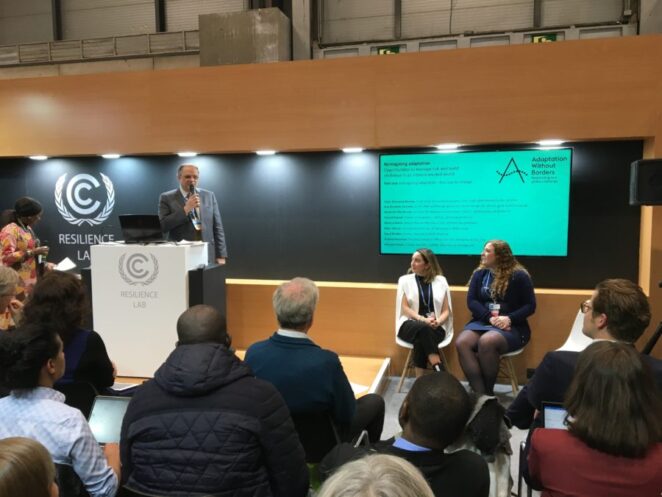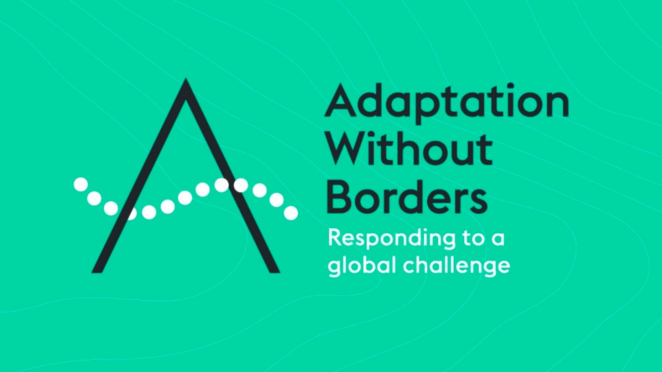The Transboundary Risks of Climate Change

The Transboundary Risks of Climate Change
“The aggregation of national interest does not amount to the global interest of the planet” – Youssef Nassef, Director of Adaptation at the UNFCCC
This blog is reposted from the Foreign, Commonwealth, and Development Office.
In line with the UK government’s climate diplomacy pillar around “Climate Change Has No Borders” as part of its presidency to the United Nations 26th Conference of the Parties, the UK Foreign Office’s international science and innovation network joins forces with UK and European partners to bring transboundary climate risk to the spotlight.
There is a strong interplay and synergy between the threats that humanity faces from the coronavirus and climate change emergencies, and the commonalities between the two are great, as are parallels to be drawn. Coronavirus and climate change threats are both environmental in origin and are global health crises, only the latter is playing out over a longer time-horizon.
On one hand, some of the drivers of climate change (e.g. deforestation and loss of wildlife) and climate change itself are playing an ever-greater role in driving the global emergence and resurgence of infectious disease, whilst greenhouse gas emissions (through smog and air pollution) and extreme temperatures are multiplying the very same health problems that underlie coronavirus vulnerabilities, such as respiratory and cardiovascular disease. On the other hand, the coronavirus pandemic has temporarily thwarted numerous international events and activities this year set out to advance negotiations and decision making processes for the mitigation of climate change (e.g. One Planet Summit, Ocean Conference, IUCN congress and COP26), at the same time as there are growing concerns over roll-back of environmental regulations in light of the pandemic. Furthermore, infectious disease pandemics such as coronavirus are also likely to exacerbate the challenges in responding to (or recovering from) the impact of climate change (and vice versa), as may already have come to bear in case of Cyclone Harold’s devastation on the Pacific Islands.

Over the last few months, the coronavirus pandemic has illustrated how highly vulnerable our interconnected global economy and society is to risks and threats that may emerge from afar, and how the response of a single country to a crisis can have a cascading impact on other countries’ ability to deal with that same threat. This statement holds true for the climate change emergency as much as it holds true for coronavirus, in regards to risk and adaptation.
A few years ago, the UK Committee on Climate Change conducted a risk assessment which for the first time set out to assess risks posed by climate change globally to the UK. The assessment highlighted two particular cross-border risks that required immediate policy action: climate-related displacements of populations and risk to food safety as a result of weather-related shocks to international agricultural production and food supply-chains. These findings were largely in line with earlier findings from a Defra-sponsored report by PwC from 2013, warning that international threats from climate change to the UK could be “an order of magnitude larger” than domestic threat – particularly in areas of trade and investment and food supply chains.
Recent years have seen the threat of population displacement as result of climate change become increasingly solidified in the burgeoning lexicon of climate threats for policy experts and decision-makers. Particularly, following an eye-watering World Bank report in 2018 warning of the displacement 143 million people in the next three decades due to water scarcity, crop failure and rising seawaters -with Sub-Saharan Africa, South Asia and Latin America highlighted as the epicentre for this crisis. In fact, recent decades have seen numerous cases of displacements and migrations across the world due to weather extremes indicating that this climate threat may have already begun to unfold.
On the contrary, less recognised and under-explored are the flurry of transboundary climate risks that stem from the impact of weather-related shocks on international agricultural production and food supply, as well as the economic (and in some cases, political) volatility that are exported across the world via associated price shocks and reduced food access. The latter could emerge as direct result of climate change impact on the country in question (e.g. reduced crop yield), or indirectly, as result of that country’s adaptation response (e.g. export ban). The mechanisms of transmission for transboundary climate risk are complex as a plethora of environmental, economic and socio-political factors could, sometimes acting in concert, directly and indirectly influence vulnerabilities and resilience to these risks across borders. The gravity of these systemic climate risks needs to be recognised and acknowledged as a common concern, as they will have serious impact on international trade and supply chains, capital flows, human mobility and natural resources shared between countries, on both regional and global level.

As with the coronavirus pandemic, there needs to be a paradigm shift in how climate risk and adaptation is approached on the national and international level as it is clear that the global impact of climate change requires a concerted adaptation effort that goes beyond the action of an individual country or the mere sum of individual actions of countries. In light of this, the Overseas Development Institute, the Stockholm Environment Institute and the International Institute for Sustainable Development and International Relations launched the Adaptation Without Borders Initiative (AWBI) earlier this year, with the support of the UK Foreign and Commonwealth Office through its European Prosperity Fund. The aim of AWBI is to instigate this paradigm shift by raising the visibility of transboundary and systemic climate risk, gathering evidence and analysis and build a diverse global coalition of partners to work together to drive action to strengthen international cooperation to manage transboundary climate risks. Unidentified, unassessed and ungoverned transboundary climate risks are certain to exacerbate the devastating effects of climate change and therefore in nobody’s interest. AWBI will support the work of policy-makers and adaptation planners, through the generation of transboundary risk assessments, technical guidelines and capacity building to bolster adaptation plans, by revealing hidden vulnerabilities and promoting risk-informed responses – at national, regional and global levels.
Transboundary climate risks circle the bewildering paradox that other countries could be the source of threat as well as aid. Yet, the recognition of the shared risks within and between regions is imperative to unlock shared benefits through international collaboration – this applies today in the time of coronavirus and will certainly apply in tomorrow’s world of global heating. Therefore, the UK Foreign Office’s international science and innovation will be working closely ODI, SEI and IDDRI to bring transboundary climate risk to the forefront in the run-up to COP26 next year and beyond.
Mikael Allan Mikaelsson PhD is the Europe Head of Clean Growth and Climate Change for the UK Government’s international science and innovation division, under the auspice the UK Foreign & Commonwealth Office (FCO) and Dept. for Business, Energy & Industrial Strategy (BEIS).
This piece first appeared on the Foreign & Commonwealth Office blog.
(0) Comments
There is no content